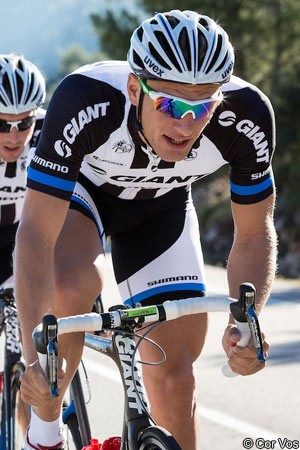German sprinter says sport has become cleaner but that some will always try to cut corners
 The most successful sprinter in last year’s Tour de France, Marcel Kittel, has said on the eve of the Dubai Tour that clean riders in the sport have an obligation to be vocal about the necessity of racing without doping products.
The most successful sprinter in last year’s Tour de France, Marcel Kittel, has said on the eve of the Dubai Tour that clean riders in the sport have an obligation to be vocal about the necessity of racing without doping products.
“The most important thing for us young riders is to show that we are different,” the Giant Shimano rider told Gulf News. “We need to show that we are here to fight for our voice and that we do not want to be compared to those riders who have cheated or are cheating.
“We are ready to fight for our idea of cycling and we want to make clear what we want.”
Kittel has spoken out against doping for several years. Last July he called for lifetime bans and criminal charges against those who dope. Soon afterwards, he agreed to undergo a lie detector analysis for German Sports Bild magazine.
The forensic psychologist Holger Leutz concluded that on the basis of the physiologicial responses from that test that Kittel was speaking the truth when he said he didn’t dope.
“The things we have monitored during the interview were very evenly measured,” he stated then. “That is a sign of credibility. Kittel makes us believe in a pure generation of cyclists. I dare say in response to what the detector indicates that Marcel Kittel has never used doping and is a clean athlete.”
Kittel had previously faced accusations when it emerged in 2012 that he had been administered the controversial black light therapy while being treated by the doctor Andreas Franke at an Olympic training site in Erfurt. However he said that he was being treated for illness and stopped in 2008.
Importantly, the practice was only added to WADA’s banned list three years ago, meaning it was not illegal at the time. The agency confirmed to VeloNation in February 2012 that the practice was not breaking the rules prior to 2011.
Kittel said that his Giant Shimano team was also opposed to doping. “Our team philosophy is very clear,” he stated. “We want high professional sport that is clean and we live that philosophy. And that’s exactly what we try to show spectators, other riders and anyone who is interested in our sport of cycling.”
Unlike others who try to convince the fans that the problem is completely in the past, Kittel is a realist and said that human nature is flawed and that some riders in the sport will likely continue to try to cut corners.
“I want to make one thing very clear: I am not sitting here and saying cycling is completely clean of doping,” he stated. “There are people who are always trying to take shortcuts to success. But I do believe we have made very good progress and cycling is one of the leaders when it comes to anti-doping.”
He identified the Lance Armstrong case and the related investigation by USADA and others as an example of how the sport can benefit from looking at the past. “It was important for all to know how it happened so that future generations do not make the same mistakes all over again,” he stated.